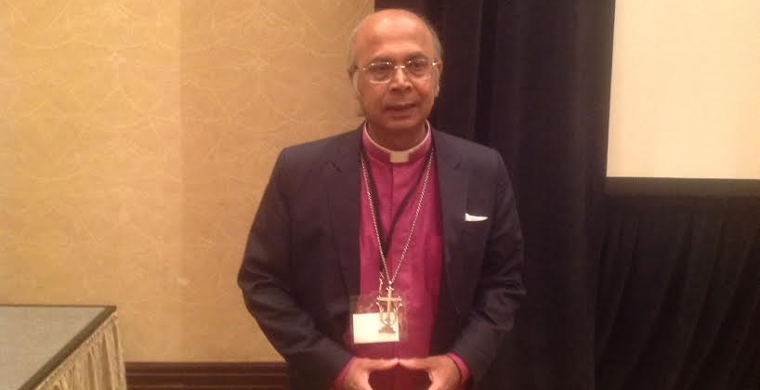FT. WORTH: UK Bishop Nazir-Ali Sees Little Hope for the Future of the Anglican Communion
Former Bishop of Rochester Speaks Out Against the Ordination of Women
Using feminine language for God is non-negotiable, he says
By David W. Virtue and Michael Heidt in Ft. Worth
www.virtueonline.org
July 16, 2015
The former Bishop of Rochester, Dr. Michael Nazir-Ali told some 350 Anglicans at a conciliar gathering of Catholic Anglicans that the Anglican Communion is divided and prospects for the future unity of the global family are tenuous, "if not impossible."
In response to a question put by VOL as to whether there would come a time when the Global South Primates and GAFCON really could remain with Western Anglican revisionists, the Pakistani-born orthodox Anglican bishop replied, "I think living together is already proving difficult, if not impossible. This is the reason for the impossibility of gathering the Communion. People are simply not able to come together. Primates are unable to meet. Will there ever be another Lambeth Conference? We don't know. How tragic that is, but nevertheless, we have to be realistic. There is no interchangeability of ministry anymore. In all of those signs of ecclesial communion haven't quite disappeared but are disappearing fast."
The former Bishop of Rochester warned participants at the International Congress of Catholic Anglicans (ICCA) meeting in Fort Worth, against the ordination of women, suggesting that it led to false language about God and a denial of revealed truth.
Speaking to Jesus' prayer for unity in John 17: 21, "That they all may be one," Nazir-Ali reminded listeners that unity was contingent on truth, quoting John 17: 19, "And for their sakes I sanctify myself, that they also might be sanctified through the truth."
After saying that "you can't just put unlike things together," Bishop Michael Nazir-Ali gave examples of contemporary issues that contradict the truth found in Scripture and the Church's teaching, threatening its unity. Nazir-Ali singled out the ordination of women to the priesthood and the consecration of women as bishops.
"We are facing a situation," said the Bishop, "where women have been ordained as priests and consecrated as bishops, and because of this the church has to revisit its language about God." For Nazir-Ali, the result of this was potentially catastrophic because the "whole Bible and usage of the Church," speaks of God as Father and husband, and his people as feminine.
"There is something fundamental about this language that we cannot change," he stated, "We have created the conditions not just for revision but for wholescale change." The Bishop went on to say that how we speak about Jesus reveals our faithfulness, or otherwise, to reveal truth. Masculine language, added Nazir-Ali, is non-negotiable:
"One of the things we must continue to say about the Holy Spirit is that the spirit glorifies Jesus, brings to our remembrance the words of Jesus. This language is not up for negotiation."
The retired Bishop of Rochester's comments come in the context of the Church of England's recent decision to allow women to become bishops, and renewed calls by supporters of women's ordination for feminine language to be used to describe God.
Rev. Emma Percy, chaplain of Trinity College, Oxford, and a member of the women's ordination pressure group, Women and the Church (WATCH), spoke out in favor of changing the way the Church of England speaks about God in its services.
"When we use only male language for God we reinforce the idea that God is like a man and, in doing so, suggest that men are therefore more like God than women," she told The Sunday Times earlier this year.
"This means that women can see themselves as less holy and less able to represent Christ in the world. If we take seriously the idea that men and women are made in the image of God, both male and female language should be used."
As well as criticizing the changes proposed by members of WATCH and others women's ordination advocates, Nazir-Ali went on to defend heterosexual marriage, saying that the "sexual differentiation" of men and women was non-negotiable. Referring to St. Augustine of Hippo, the Bishop cited, "For Augustine, sexual differentiation has to do with creation, and is not a result of the fall."
According to Nazir-Ali, one of the dangers society faces is a "radical attempt to blur this differentiation." If that happens, "Then everything becomes possible. We must affirm the goodness of sexual differentiation, and of marriage."
The Bishop then made what he called "some modest proposals" for authentic church unity. "If I were pushed into a corner and asked what it is that makes a church," he told his listeners, "I would suggest the passing on, receiving and passing on again of apostolic teaching." Referring to Cardinal John Henry Newman's "continuity of principles," Nazir-Ali said that this "passing on" has to be internally consistent, in accordance with the Gospel and with the "anticipation of the future."
Nazir-Ali concluded by outlining a vision for the Church that was "confessing and creedal" and dependent on the Holy Spirit.
"What forms should our gatherings take? A confessing and creedal church," that, "also comes together to confer, and to confirm the faith of believers. The mistake that we have made is to confuse our gatherings with parliamentary gatherings. Authentic synodality has become merely synodical," that confused "hierarchy of function with democratic majorities," he told Congress participants.
"It is unlikely that the unity of the Anglican Communion will come about by fiddling with institutions," he said, "We should look for these movements of the Spirit."
YOUTUBE: https://www.youtube.com/watch?v=bq0icT5k_gw
Michael Heidt is Editor of Forward in Christ magazine and a priest in the Diocese of Fort Worth














